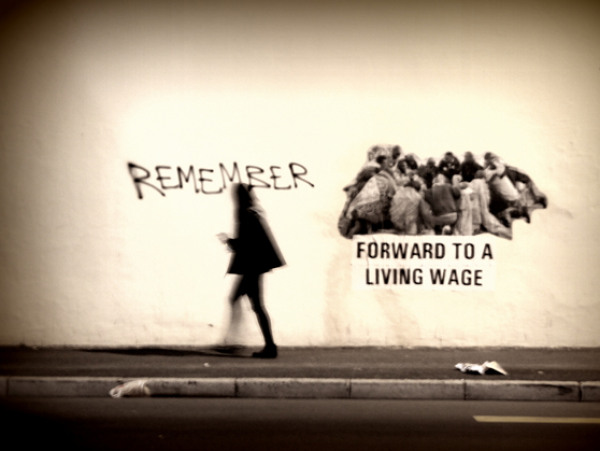

“Forward to a living wage” street art by Amanye Amaxesha commemorating the massacre at Lonmin in 2012.
22 August 2014
In this week in activism, the massacre at Lonmin mine is remembered two years on, relief in the courts for people removed from Saratoga Avenue by the City of Johannesburg, and anticipation mounts ahead of the release of the report by the commission into policing in Khayelitsha.
This past week, South Africans remembered the lives of those who died in the massacre at Lonmin mine. 16 August marked the two year anniversary of 34 miners who were shot and killed by police in the protests for wage increases.
A group of young activist have formed a collective called Amanye Amaxesha to take part in installing commemorative art around the City.
“The technique we use is called flyposting or wheat pasting, which is a form of street art that involves pasting printed images and words on walls and bridges as a means of taking over public spaces,” said one of the activists.
“Our wheat pastes have gone up in District Six, as well as the City Centre (particularly Roeland, Buitensingel, and Orange Street). Unfortunately many of them have already been taken down but we will continue to put up more in future, explore different themes, and move beyond the City Bowl.”
See photos of the work here.
The Socio-Economic Rights Movement of South Africa released a statement on 22 August on the High Court’s ruling on the City of Johannesburg’s temporary accommodation model.
The Ekuthuleni shelter was provided by the city as a temporary home for residents who were relocated from Saratoga Avenue following a judgement by the Constitutional Court in 2011.
There were a number of rulings made by the court on the living conditions of residents at the shelter.
The court ordered that two house rules being imposed on residents of the Ekuthuleni shelter were an unjustifiable infringement on the residents’ rights to privacy, freedom, security of the person, and human dignity.
The High Court found that the policy that disallows spouses and life partners from living together at the shelter is unjustifiable and had “humiliating consequences”.
The court also found that the residents fall under the category of people who require temporary or emergency accommodation but do not fall under the category of people who normally visit an overnight shelter.
Read more on the judgement:.
Read more on the case.
Residents will meet in Town 2 in Pine Road at 11:00am to march to Lookout Hill on Monday, 25 August 2014 to hand over the Khayelitsha Commission of Enquiry Report. The report will be handed over to the Western Cape Premier, Patricia De Lille.
On 29 and 30 August, the Social Justice Coalition with a number of other NGO’s plans to march with residents to all police stations around Khayelitsha to submit the report of the commission of enquiry into policing. 500 people are expected to participate in the march.
Another big march will take place on 3 September in the CBD starting at Keizersgracht moving to the Civic Center then proceeding to march to Provincial Parliament then move to National Parliament. 2500 people are expected to part in the march.
The Khayelitsha Commission of Inquiry was established following complaints lodged with the Premier of the Western Cape by civil society organisations about police inefficiency in Khayelitsha, as well as a breakdown in relations between the police and members of that community.
For more information see SJC